- Home
- Jason Pinter
The Mark Page 2
The Mark Read online
Page 2
“Paulina,” Wallace said stepping aside, allowing her to view me in full. “Meet Henry Parker. This is his first day on the job.”
Paulina shriveled her nose. “He’s taking Phil’s old desk.”
Wallace coughed into his hands, slightly embarrassed. “Yes, he’s taking Phil’s old desk.”
Paulina scanned me as if reading a computer printout. Finally she extended her hand. I shook it, her grip limp and apathetic.
“Welcome to the mad house, new guy,” she said.
“Thanks. I’m excited to…”
“Tough luck taking Phil’s old desk. You tell him what happened to Phil, Wally?”
Wallace sighed. “No, I haven’t had the chance yet.”
Paulina shrugged. “Bad karma, Henry.” She looked at me inquisitively. “Henry. That’s a strange name for such a young man. How’d you get saddled with that?”
“Saddled? I…”
“What, your parents didn’t like you?” My eyes hardened. Paulina could tell she’d dug too far, and her face became all twinkles. “I’m just playing with you, Henry. You’ve got a fine name. I like things that are different.” She looked up at Wallace, apparently satisfied with my answers. “This is the kid from Oregon, right?” She looked at me again. “Wallace told me you were, quote, a prize find. That right?”
I tried to ease the tension. “Yeah, Kmart was having a blue-light special on junior reporters. Wallace got me at twenty-five percent off.” Paulina’s eyebrow cocked and she shook her head. Wallace turned away in shame. I gave myself a mental slap.
Paulina said, “That’s not funny, Henry. You haven’t been here long enough to get away with making shitty jokes.”
“Sorry. From now on, only funny jokes.”
“Or no jokes,” she said.
“Or no jokes.”
She smiled, much warmer now.
“Good.” Paulina held up a pen, its nub chewed to a quick. I noticed several pairs of shoes under her desk. Shiny red dress shoes, worn sneakers, broken-in Birkenstocks.
“If you’re smart, you’ll keep a few good pairs of shoes around the office,” she said. “You never know what kind of story you’ll have to chase at a moment’s notice. You need to be prepared at all times.” Wallace nodded. I made a mental note to bring in my old Reebok pumps.
“Best of luck to you, Henry,” she added. “Wally’s a good guy. Listen to what he says.”
“Absolutely.”
Paulina turned back to her computer and began typing away.
“She’s a fine journalist,” Wallace said softly. “Paulina, here, found our hero of the day six times this month alone.”
“Seven times, Wally,” Paulina said. “If you fuck that up on my performance review I’ll call my lawyer.”
“Hero of the day?” I asked.
“Every day has a hero,” Wallace said. “It’s our page-one feature, the main attraction, the story that sells papers. One day it could be the war, the next it’s the elections, the next it could be a man who keeps a Bengal tiger in his apartment as a pet or a celebrity discovered screwing his babysitter.”
Paulina added, “Every day has a different hero. Simply put, it’s that day’s biggest news. Every day needs a hero. Without one, there’s no news. We don’t sell papers, the Gazette brings in no money, we all get canned, you’re back in bumblefuck Oregon before the month is out. Plus, whichever reporter reports the most heroes over the calendar year gets a pretty nice bonus. So get cracking. There are a lot of rocks out there to turn over.”
Wallace said, “Don’t worry. You’ll have your chance. For now, though, try to observe how your new colleagues work. It’ll be hard to gain your footing and find your voice. Just remember everyone here started out exactly where you are. Mickey Mantle was an Oklahoma boy before he came to the Yankees. Pretty soon, you’ll be finding your own heroes for us.” He became serious, leaned in closer. “We’re counting on you to find ones that matter.”
Paulina chimed in, “Unlike Phil.”
Wallace nodded resignedly. “Yes, unlike Phil.”
I decided not to inquire about this Phil. It was newsroom gossip and I hadn’t earned the right.
“Well, have a seat,” Wallace said. “See how the old desk fits you.”
Watching Wallace to see his reaction, I settled into my new chair. The seat wasn’t meant for comfort, rather for a body that was constantly fidgeting, moving around. Designed more to keep you awake than keep you relaxed, and I was sure my spine would hate me for it.
“Well?”
“It’s perfect,” I said. Wallace laughed.
“Bullshit, but you’ll get used to it. Let’s have lunch Thursday. HR will send you info about benefits and 401k. Give me a holler if you need anything.” Just then a voice rang through the office. Wallace’s secretary.
“Mr. Langston! Rudy Giuliani on line two.”
He muttered, “Shit, he’s probably pissed about the piece on page five.” Wallace gave me a quick pat on the back. “And Henry?”
“Yeah?”
“Don’t wear a suit and tie again. You’re a journalist, not a stockbroker. Lesson number one, your sources will want to feel you’re on their level. Not a level above them.”
As I settled in, Paulina turned to me, a cagey look on her face.
“And one more thing,” she said.
“Yeah?”
“Remember one thing, and make sure you remember it good in every story you write. Ninety percent of this job is reporting good versus evil. And without evil, we’d be out of a job.”
2
“I s a good space,” Manuel Vega said, inserting a nicked key into the lock. He met some resistance, smiled as though it was intentional, then jarred the door open with his shoulder. After seeing—and rejecting—twelve apartments in barely a month, I prayed this one would fit in my budget. Not to mention fit me.
The stench of mildew immediately attacked my nose. Flecks of white paint spotted my coat where I brushed against the doorframe. A rasping noise, like the death throes of an elderly marsupial, emanated from the radiator.
Putting my hands in my pockets, I gritted my teeth. “And this is how much?”
“Nine seventy-five a month. Six months rent paid in advance.”
It was manageable. Plus this was the only apartment I’d seen remotely in my price range and still on the island of Manhattan. Most were double the price and equal in size to my baby crib. Right now this apartment, nestled on the Northwest corner of 112th and Amsterdam, whose lone streetlamp seemed to share an electrical outlet with every hair dryer in the city, was the only one I could afford without turning tricks. And if I was going to work at a newspaper, a NewYork paper, I didn’t want to live anywhere else but in the city. If I was in, I was in all the way.
The last three weeks I’d been squatting with my girlfriend, Mya Loverne, at her apartment. Every second spent together was filled with palpable tension. We counted the moments until I finally got my own place. Most couples couldn’t wait to move in together. We couldn’t wait to be apart. I had eight grand in my bank account, savings from summers spent writing for the Bulletin back in Bend and odd jobs I took to offset my financial aid at Cornell. It took all my strength to go home after each semester ended, but I couldn’t afford summer housing. I could live for free in Oregon. I could live with being a ghost in my own home. That was the only way I could stay sane, slipping in and out without saying a word to the man on the couch, or the woman who couldn’t do anything to stop him. Eight grand was all the money I had in the world. I sure as hell wasn’t expecting any monthly stipend from the man I stopped calling Dad a long time ago.
Mya was a 2L at Columbia. Her father, David Loverne, was the former dean of Fordham law, had made a killing sitting on the Internet bubble and selling right before it burst. Needless to say, her ticket was punched a long time ago. The first two years of our relationship at Cornell were a dream, and just like a dream they ended before we knew what happened. The third brutal year felt lik
e the cold sweat residue from a nightmare that never really ended. Mya was a year older. She moved to New York when she graduated. I stayed in the frigid barrens of Ithaca and watched our relationship freeze.
It was just a few months ago, this past February, that our relationship was dealt a mortal wound. Since then our pulse had slowed, the gangrene of that horrible night spreading and poisoning us. We hoped things would get better when I moved to the city, like a couple in a failing marriage that decides to have a child in the hopes that it will “bring them together.”
I found Manuel Vega on Craigslist. The announcement was in tiny lettering, as though embarrassed to compete with the bigger notices with bolder font.
“So you’ve seen the apartment. Now you rent the apartment,” Manuel said. He pulled a piece of paper and pen from his pocket, held them out to me.
“Whoa, hold on a second, chief. What if I don’t want to rent it?”
“What’s not to like?” he said, as though personally insulted. “You have four walls, ceiling. Refrigerator even.”
How could I argue with that logic?
The price seemed reasonable, even for such a uniquely odorous pad, and I had no other options. Manuel even offered to cram himself into the fridge to prove its square footage. I politely declined.
After briefly investigating for vermin, and finding none visible, it was time to get down to business. I needed the space. Maybe space would bring Mya and I closer. And maybe there were gold bricks buried along with Jimmy Hoffa in the walls.
“So, six months rent, up front. That’s a lot,” I said, sighing. Unbelievable. I was on the verge of shelling out over two-thirds of my savings for an apartment that looked like the only witness to a teen horror flick.
“Up front. You pay down payment now.”
“If I take the apartment,” I said. Manuel shrugged and nibbled a fingernail.
“You don’t take now, someone will tomorrow.”
“That right?”
“I place the ad yesterday, amigo. You the third person to see it today. You write check today, maybe I tell the others to scram.”
“Damn,” I said, a little too audibly. “Is there a cable hookup? Is the apartment Internet-ready?”
“Of course,” Manuel said, a toothy grin spreading over his face. “You have all the Internet you want.”
“All right,” I said through gritted teeth. “I’ll take it.”
I took the papers, read them over.
“You fill these out now, have a certified check for me tomorrow for the first six months. Six thousand, eight hundred seventy-five dollars.”
“You mean five thousand, eight seventy-five.”
“Yes, right. And you don’t pass your credit check, I put ad back in the paper.”
I nodded, followed Manuel downstairs to an office on the first floor. He took a seat behind a squat metal desk littered with papers and empty candy wrappers. I filled out the application, my chest swelling when I filled in the “employer” field. When I handed it back to Manuel, he turned the page around, pointing to that very space.
“This,” he said. “Who you work for?”
“The Gazette,” I said. “You know, the newspaper.”
“You take pictures?”
“No, I’m a journalist. I’m going to be the next Bob Woodward.” Manuel eyed me, eyed the form.
“Woodward?”
“You know, Bob Woodward? All the President’s Men?”
“Yes, the building has very good woodwork,” Manuel said, tapping the wall behind him.
No sense explaining. Soon enough, everyone would know. The newsroom at the Gazette, that was my Batcave. This apartment would be my Wayne Manor, the shell covering the hero underneath. Though I doubt Wayne Manor housed mice the size of beagles.
“You’ll like it here,” Manuel said. “Just like home.”
Yeah, I thought. Just like home. Like the home I wished I’d had, instead of a clapboard box where the only noises were a faulty sink and the venom spewed from the man who called himself my father. Home. At last.
I went straight to Mya’s once we finished the paperwork. Before moving out I wanted to celebrate, spend one last night in her bed. See if those familiar sparks could be ignited one last time. I called ahead to propose a celebratory dinner, but she replied with a curt, “Henry, I have finals next week. Dinner will take hours. If you want we can grab something from Subway.”
I declined. I’d eat on the way.
She met me at the door wearing a red bathrobe, her blond hair stringy and wet. She smelled great, fresh. I wanted to gather her up, hold her like I held her when we first met. When nothing else mattered and real life seemed so far away. I placed my hand on her arm, rubbed it gently.
“Henry, I just moisturized.”
“Sorry.”
“It’s okay, it’s just…”
“I know.” She sighed, smiled faintly.
I took off my sneakers and lay them outside her door. She sat down on the bed, her lips pursed, and crossed her arms over her chest.
“So tell me about the new place.”
“Well, as far as I know nobody’s ever died in it.” Mya didn’t seem to find me funny today.
“Come on, seriously. What’s it like?”
“Well, it’s in Harlem, 112th and Amsterdam. The building won’t win any awards from House and Garden, but the utilities work, I have room to live, the door locks and that’s all I need.”
“Is it clean?”
“Well,” I said, choosing my words carefully, “I’m not sure clean is the word. But it’s livable.”
“Do you expect me to come over?”
“I was hoping you would, being my girlfriend and all.”
Mya stood up and walked to the open window. She stared out across the street. The night sky stared back, cold and un-inviting, as she chewed her nails.
“I thought you stopped chewing,” I said.
“I did for a while. Just came back.”
I could feel the brutal static between us. Why were we together? Just because we’d weathered the storm and were content to hit dry land? Or did we really think we had a chance? That maybe we’d remember those first nights, when every moment was the only reality we needed?
Staring out the window, Mya said, “I hope your apartment works out for you.”
“What’s that supposed to mean?” And this, I knew, was the end.
“That’s all I mean. I hope you like your apartment. Don’t try to analyze so much.”
“No, there was something in your voice. ‘I hope you like your apartment, but…’I just want to know what the ‘but’ was.”
Mya turned around. Her hair fell around her shoulders, her skin shined.
“I wonder sometimes, Henry.”
“Wonder about what?”
She turned back around. “Nothing.”
“Don’t do that, that thing where you ask a question and then say it’s nothing.”
“It’s not worth talking about.”
“Yes it is. It always is.” I walked over to her, put my hands on her shoulders. She shivered for a moment, then relaxed.
“Sometimes I think about things.”
I knew where this was going and felt a knot rise in my stomach. My hands fell off her shoulders and I took a step back. Then her voice got soft, quiet. “Things have been different. I think you and I both know that.”
“I know it has.”
“It’s been like this since…”
“Since that night.”
“Yes,” she said, sighing. “Since that night.”
I sat down on the bed, wrapping my arms around a lace pillow. I looked up at Mya, could see the faint scar on her cheek. It was barely noticeable unless you knew it was there. I knew it was there.
“I just think about that night and wonder if it was an omen, you know. A sign.” I nodded, knowing too well what she was saying.
“So what do you suggest we do? End it now, right when things get hard?”
&n
bsp; “This isn’t hard, Henry. Hard is what’s going to happen when I graduate from law school and you’re working night shifts at the Gazette. School and work take up time, but—” she paused “—they’re really only stepping stones. I just don’t want to slip up before I graduate. I don’t want to lose focus.”
“This isn’t—we aren’t—a stepping stone. If we work hard we’ll find a way to make it work. I know things have happened.” I hesitated, my voice catching, a lump rising in my throat. “Bad things. But we can get past them.”
“Maybe,” she said, uncertainty coloring her voice. “But when I’m a lawyer and you’re a…journalist or whatever, we’ll have even less time to talk things out. At some point we need to step back and really wonder if it’s worth it.” I knew I shouldn’t ask. It wasn’t the topic of discussion. But it burned me, and I had to.
“What do you mean a journalist or whatever?”
“I just mean when your career is on track. When you’re doing whatever you want to do.” I shook my head, tossed the pillow onto the headboard, where it lay at an awkward angle.
“You’ve never had faith in me.”
“That’s not true. I’ve always stood by you.”
“That’s easy to do in college, easy to say when you’re not even there. But what about now? Would you stand by me now?”
Mya’s face grew cold, all the life fell away from her. “Don’t you ever dare talk to me about not being there.”
Mya stepped forward and put her arms limply around my neck. She pressed her lips against mine, then removed them. I left moments later.
The next time I spoke to Mya, three men wanted me dead.
3
I f I was less ambitious, none of it would have happened. But I was stubborn, impatient. I like to think all great minds are. But I never dreamed ambition might cost me my life.
My fourth day at the Gazette, Wallace offered up my first reporting assignment. It came at the perfect time, too. Mya and I hadn’t seen each other in days. I was in desperate need of a pick-me-up. And an assignment did a better job of that than a six-pack.

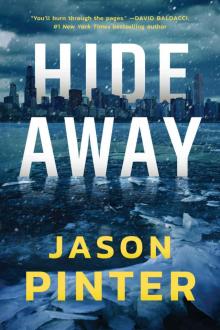 Hide Away (A Rachel Marin Thriller)
Hide Away (A Rachel Marin Thriller)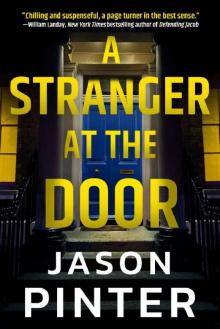 A Stranger at the Door (A Rachel Marin Thriller)
A Stranger at the Door (A Rachel Marin Thriller)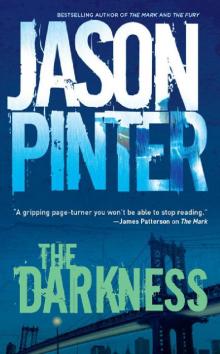 The Darkness hp-5
The Darkness hp-5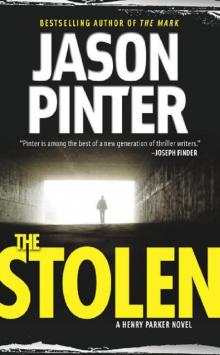 The Stolen hp-3
The Stolen hp-3 The Guilty hp-2
The Guilty hp-2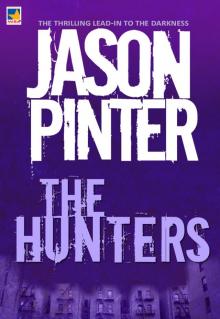 The Hunters
The Hunters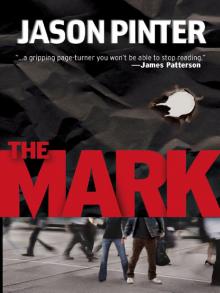 The Mark hp-1
The Mark hp-1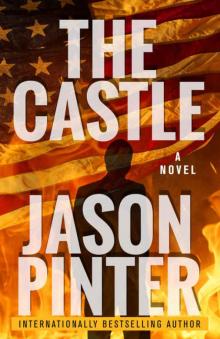 The Castle: A Ripped-From-The-Headlines Thriller
The Castle: A Ripped-From-The-Headlines Thriller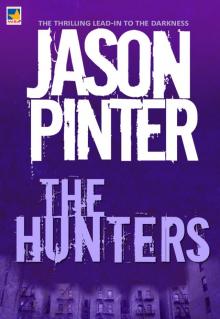 The Hunters (henry parker)
The Hunters (henry parker)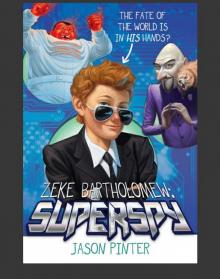 Zeke Bartholomew
Zeke Bartholomew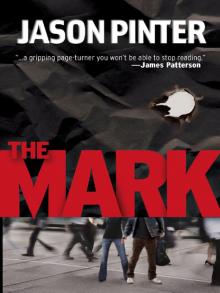 The Mark
The Mark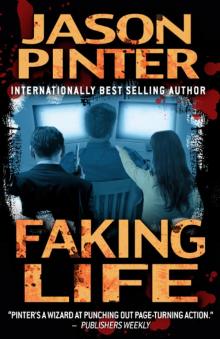 Faking Life
Faking Life![[Henry Parker 01.0] The Mark Read online](http://i1.bookreadfree.com/i2/04/08/henry_parker_01_0_the_mark_preview.jpg) [Henry Parker 01.0] The Mark
[Henry Parker 01.0] The Mark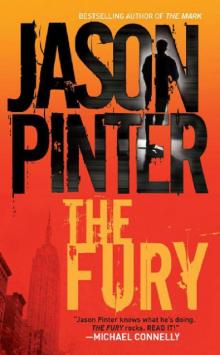 The Fury hp-4
The Fury hp-4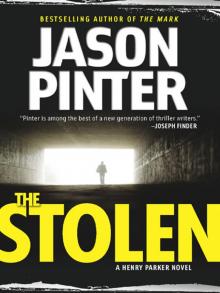 The Stolen
The Stolen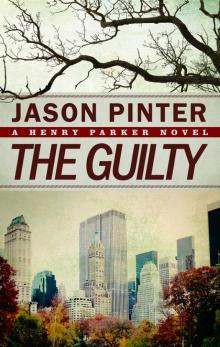 The Guilty
The Guilty